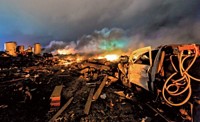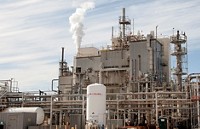Advertisement
Grab your lab coat. Let's get started
Welcome!
Welcome!
Create an account below to get 6 C&EN articles per month, receive newsletters and more - all free.
It seems this is your first time logging in online. Please enter the following information to continue.
As an ACS member you automatically get access to this site. All we need is few more details to create your reading experience.
Not you? Sign in with a different account.
Not you? Sign in with a different account.
ERROR 1
ERROR 1
ERROR 2
ERROR 2
ERROR 2
ERROR 2
ERROR 2
Password and Confirm password must match.
If you have an ACS member number, please enter it here so we can link this account to your membership. (optional)
ERROR 2
ACS values your privacy. By submitting your information, you are gaining access to C&EN and subscribing to our weekly newsletter. We use the information you provide to make your reading experience better, and we will never sell your data to third party members.
Industrial Safety
US EPA rescinds chemical industry safety provisions
Risk Management Program update reverts changes made in response to West, Texas, fertilizer explosion
by Jeff Johnson
November 22, 2019

The US Environmental Protection Agency has finalized an overhaul to its industry Risk Management Program (RMP), weakening provisions intended to protect communities and workers from industrial accidents at some 12,500 plants that use, make, or store some of the world’s most dangerous chemicals.
The RMP rule goes back to 1990 but was revised after a deadly ammonium nitrate fertilizer explosion in West, Texas, in 2013. Fifteen people were killed, mostly emergency responders. Nearby, a school, a nursing home, and an apartment building and other homes suffered damage.
With some fanfare, then-president Barack Obama ordered a sweeping examination of federal industrial safety regulations. The EPA at that time reported that some 1,500 accidents occurred over a recent 10-year period at RMP-covered facilities. Those accidents led to nearly 60 deaths, 17,000 injuries, the evacuation of 500,000 people, and property damage of more than $2 billion.
The RMP modification was the only significant regulatory change to emerge from the review, and it was issued in the last days of Obama administration. The Trump administration’s first EPA head, Scott Pruitt, attempted to withdraw the regulation but was challenged by community groups and labor unions and eventually blocked by a court order. The EPA then began the process to re-propose and finalize a replacement regulation.
Among changes announced by the EPA on Nov. 21, the new RMP regulation removes earlier provisions calling for independent, third-party audits of companies after an accident or a near-accident. It also eliminates requirements for root-cause accident investigations and for companies with poor safety records to consider inherently safer manufacturing approaches. Because of security concerns, the new rule also rescinds provisions allowing the public to obtain facilities’ hazard information and for community emergency planning.
The updated rule “maintains important public safety measures while saving Americans roughly $88 million per year,” current EPA administrator Andrew Wheeler says in a statement. Overall, Wheeler says that under the Trump administration, the EPA has finalized 48 deregulatory actions, saving industry more than $5 billion in regulatory costs.
The American Chemistry Council, a chemical industry trade association, applauds the changes and the EPA’s willingness to consider public input. “Most importantly, EPA’s changes to RMP will provide a strong regulatory framework for our industry to continue our work to safeguard chemical facilities and to work with our state and local partners to plan for a potential emergency,” Mike Walls, the ACC’s vice president of regulatory and technical affairs, says in a statement.
However, Michele Roberts, head of the Environmental Justice Health Alliance for Chemical Policy Reform, a network of grassroots environmental justice organizations, says that 177 million people live next to RMP-covered sites. Many of those people are low-income communities and communities of color, she notes.
“EPA’s own analysis demonstrated that our communities are at disproportionate risk of chemical disasters, on top of the many other toxic hazards we experience daily,” she says in a statement. “This is environmental racism.”





Join the conversation
Contact the reporter
Submit a Letter to the Editor for publication
Engage with us on Twitter